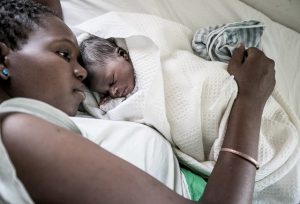November 20, 2020
Dual HIV/syphilis rapid diagnostic test cost-effectiveness analysis, that changed WHO recommendation, published in the Lancet Global Health

Dual elimination of mother-to-child transmission (MTCT) of HIV and syphilis is a public health priority. Global efforts for the prevention of MTCT of HIV have led to substantial reductions in new pediatric HIV infections, but progress for preventing congenital syphilis—a sexually transmitted infection that causes stillbirths and other infant health problems—is much slower. While dual HIV and syphilis RDT have some promise to curb pediatric HIV and syphilis, the cost-effectiveness of using these tests in antenatal care settings in a variety of settings has not been explored.
To close the gap, the World Health Organization (WHO) released a new policy brief recommending countries offer a single rapid diagnostic test (RDT) that screens pregnant women for HIV and syphilis simultaneously. The dual-purpose test will save costs for countries, especially those with limited resources, introducing this strategy into antenatal care settings. By testing a larger proportion of women with a single accurate test that is simple to use, rather than a smaller proportion with separate HIV and syphilis tests, pregnant women who test positive for either infection can rapidly start treatment and prevent infections among infants.
The evidence emerged from a cost-effectiveness analysis, led by Dr. Alison Drake (Assistant Professor, Department of Global Health), of incorporating dual HIV and syphilis RDTs into antenatal care visits in four countries with varying HIV and syphilis prevalence: South Africa, Kenya, Colombia, and Ukraine. In addition, the analysis evaluated the impact of using the dual HIV/syphilis RDT as a strategy to retest for HIV and syphilis later in pregnancy.
“Gaps in maternal testing and treatment coverage currently lead to 180,000 infant HIV infections, 355,000 adverse congenital syphilis birth outcomes, and 306,000 non-clinical congenital syphilis cases every year. We find that the use of a dual HIV/syphilis RDT as the first test during antenatal care can increase maternal syphilis testing and treatment coverage, thereby improving health outcomes for women and their children, while at the same time reducing costs,” says Tricia Rodriguez, PhD student in the UW School of Pharmacy involved in the research team conducting the analysis and first author of a new publication in the Lancet Global Health today. The paper was published in collaboration with UW Departments of Global Health and Medicine faculty members, UW Department of Epidemiology PhD students, Center for Disease Control, Clinton Health Access Initiative, Global Fund to Fight AIDS, Tuberculosis and Malaria, Kenya Ministry of Health, London School of Hygiene & Tropical Medicine, South Africa National Department of Health, and WHO.
“As a result of these findings, WHO issued new policy recommendations supporting dual HIV/syphilis rapid diagnostic tests as the first test for pregnant women receiving antenatal care. Incorporating dual HIV/syphilis testing into routine antenatal care may help improve maternal and infant health outcomes, helping to accelerate progress towards elimination of mother-to-child HIV transmission and congenital syphilis,” says Dr. Drake.